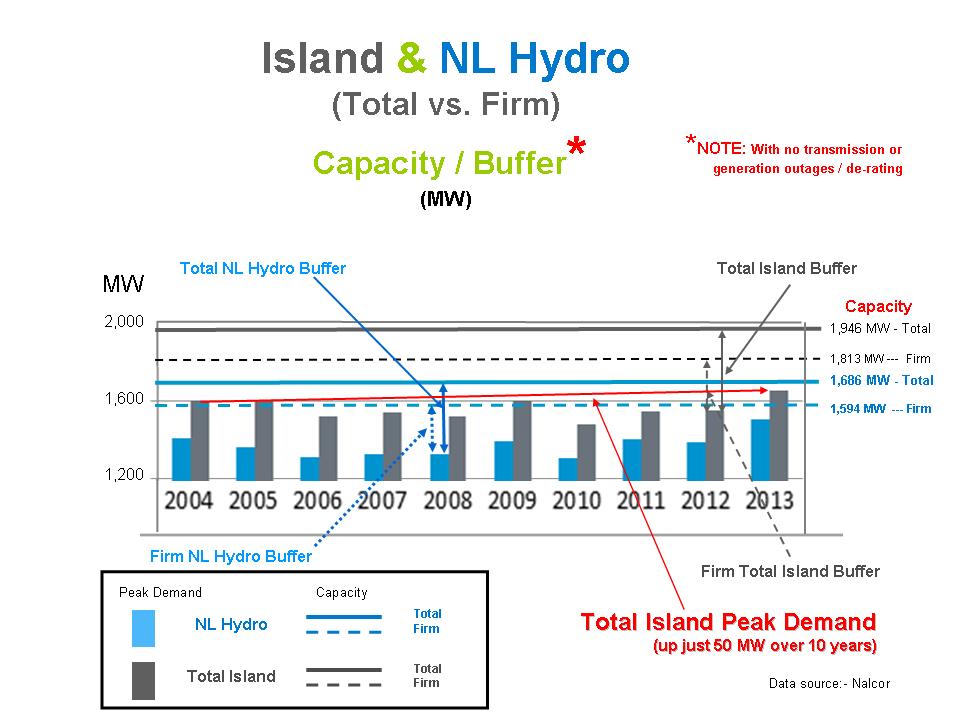From: Maurice E.
Adams
Sent: May-03-14 12:44 PM
To: Cheryl Blundon
Subject: The Board's Investigation and Hearing into Supply Issues and
Power Outages on the Island Interconnected System
- Request for Comments (2nd CORRECTED COPY)
My
apologies again, Ms. Blundon.
I appears that my earlier (and corrected) Written
Comments on the above-noted subject contained a significant error with respect
to the total Island Interconnected System peak demand (CORRECTED
VERSION BELOW).
Accordingly, I have made a final correction to issue #2 and included a 4th
info-graphic to help clarify the issue.
Thank you, once again, for your consideration of this important matter.
Best regards,
Maurice E. Adams
Good day Ms. Blundon.
With respect to the above-noted matter.
Summary Comments
Key Issues
1.
Liberty Consulting appears to be well qualified in the areas of
power generation, transmission/distribution/
2.
maintenance management systems, load forecasting, etc.
I would,
however, submit that
- there
is no clear evidence that Liberty Consulting has the requisite expertise
in the areas of conservation
and efficiency - conservation
and efficiency are key issues identified by the Board, and I would suggest
that when
integrated with other options, conservation and efficiency may be the most reliable and lowest possible
cost option for addressing short, medium and long term requirements - conservation
and efficiency programs in other jurisdictions appear not only to be able
to reduce energy use,
but may help even keep rates stable or reduce them - other
than a brief commentary in Liberty's interim report concerning NL Hydro
and NL Power
'communicating' their requests for consumers to conserve energy, the absence on any substantial
information and/or recommendations in Liberty's report related to the issue of conservation and
efficiency is (I would suggest) evidence to suggest that Liberty Consulting may not have the
requisite expertise to properly consider, assess, and where appropriate, integrate these issues into the
island's future electricity load, reliability and cost configurations - the Board should obtain
independent consulting expertise in the area of conservation and
efficiency
(the level of such expertise should be similar to that demonstrated by Liberty Consulting in the areas
of power generation, transmission/distribution/maintenance management systems, load forecasting,
industry best practices, etc.)
2. It seems clear (from
Liberty's interim report) that the root causes of the electricity supply and
outage
issues of 2013 and early 2014 were grounded, first and foremost,
not in the failure of the island's
generation capacity as such, but in NL Hydro's maintenance, upgrading,
and parts supply failure of
its transmission/distribution systems (such as breakers and
transformers), and it is these that in turn
caused the generators at Holyrood to shut down.
I would submit
therefore that
- NL
Hydro's emphasis on adding "new generation" is misplaced, and not
supported by the facts or
even by the evidence in Liberty's report - the facts show that while NL Hydro
reports the existing total Island Interconnected System capacity
at 1,946 MW and firm capacity at 1,813 MW, NL Hydro's data shows that the total Island
Interconnected System peak demand for 2013 was in the vicinity of only 1,630 MW. Accordingly,
the existing Island Interconnected System's total "available" capacity for 2013 should therefore
have been more than 300 MW above peak demand and the existing Island Interconnected
System's "available" firm capacity should have been almost 200 MW ABOVE the total Island
Interconnected System peak demand (see 4th info-graphic below, copied from
http://www.vision2041.com/demand.html ) --- and Liberty Consulting Interim Report confirms that
it is the Island Interconnected System capacity and requirements (not just the NL Hyrdo System
capacity and requirements) that is most significant (Liberty's Recommendation No. 7 refers) - accordingly,
the existing total and firm generation capacity should both have been
more than
adequate --- if NL Hydro had done the proper upgrades, parts supply and maintenance on its
transmission/distribution and generation systems - Liberty's
interim report (page ES-2) states, in part, that "Addressing the
continuing risks of
supply/demand imbalances requires either or both of adding resources and making sure
that existing resources are available at peak times (during winters in the case of
Newfoundland and Labrador)" -- emphasis added - clearly,
Liberty's interim report identifies the problem --- not as being
"inadequate" existing
resources, but clearly a supply/demand "imbalance" --- an imbalance that can be addressed
by EITHER adding new generation OR by "making sure that existing resources are available
at peak times" -- emphasis added - the
Board should consider NL Hydro's planned, improved maintenance management
system
(which I understand was recommended by Liberty and is to be submitted by June 15, 2014)
before it makes a decision on the most reliable (and lowest possible cost) immediate and short
term option. - the evidence (and past events)
confirm and demonstrate clearly that even when NL Hydro
has had a firm capacity that is already in excess of peak demand, excess capacity has not
been sufficient to ensure that NL Hydro has been able to provide island ratepayers with
reliable service. Increasing that already existing "excess" capacity is clearly not addressing
the fundamental problem --- NL Hydro's failure with respect to the maintenance management
of its existing resources - accordingly,
I would suggest that adding new generation to address what is
fundamentally
a maintenance problem is not in the best interest of ratepayers, not the lowest cost, provides
no confidence that such new generation will indeed be 'available', is not necessary and does
not address the root problem
3. It is clear from the
info-graphics (below) that the island's already existing generation capacity
is already underutilized (copied from http://www.vision2041.com/holyrood.html)




Notwithstanding the above-noted information, it should be noted that Holyrood rarely operates at capacity (1.6 percent of the
time), or
less than 6 days per year (and not at
all in year 2011).
Surely, ratepayers should not have to pay even more because NL Hydro has not
properly maintained its transmission and distribution
systems and is under-utilizing its already existing excess generation capacity.
Respectfully,
Maurice E. Adams